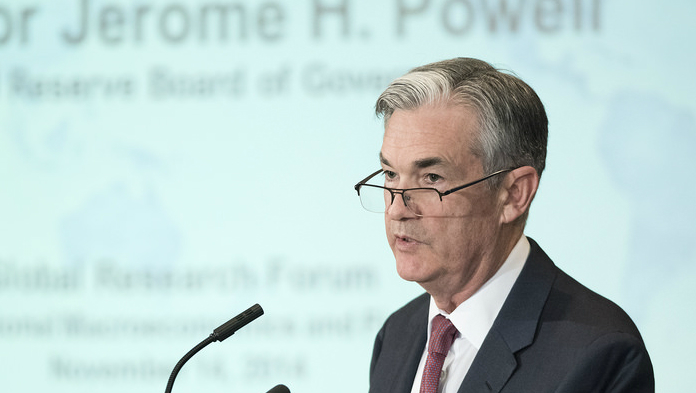Fed cuts interest rates for first time in a decade: why it matters
Reduction of 0.25% fails to satisfy Donald Trump

A free daily email with the biggest news stories of the day – and the best features from TheWeek.com
You are now subscribed
Your newsletter sign-up was successful
The US Federal Reserve has cut interest rates for the first time in more than a decade in a bid to sustain the longest economic expansion in the country’s history.
US interest rates will now be between 2% and 2.25%.
The last time the country’s central bank cut interest rates was 2008, in response to the global financial downturn, which began with US junk debt.
The Week
Escape your echo chamber. Get the facts behind the news, plus analysis from multiple perspectives.

Sign up for The Week's Free Newsletters
From our morning news briefing to a weekly Good News Newsletter, get the best of The Week delivered directly to your inbox.
From our morning news briefing to a weekly Good News Newsletter, get the best of The Week delivered directly to your inbox.
With global growth now slowing once again, financial chiefs in the UK are also playing it cautious. The Bank of England today announced that it was leaving interest rates unchanged at a near-record low of 0.75%.
The cut over in the US follows months of pressure from Donald Trump, as the president broke with the tradition of the administration keeping out of the Fed’s business, reports CNN.
But the 0.25% cut announced by Fed chair Jerome Powell is not enough to satisfy the US leader, who are recently as Monday was lobbying for a bigger reduction.
Responding to the news, Trump tweeted: “As usual, Powell let us down.”
A free daily email with the biggest news stories of the day – and the best features from TheWeek.com
The decision by the ten members of the Fed’s rate-setting committee was not unanimous, with Boston Fed president Eric Rosengren and Kansas City Fed president Ester George voting against the cut.
Nor did the markets react well to the move, with the main stock market indexes on Wall Street closing more than 1% lower after the cut was revealed, notes the BBC.
According to Trump, the drops reflected disappointment that Powell did not announce whether there would be further reductions to come.
In a series of angry tweets, the president claimed: “What the market wanted to hear from Jay Powell and the Federal Reserve was that this was the beginning of a lengthy and aggressive rate-cutting cycle which would keep pace with China.”
Trade war tactics?
Announcing the cut, Powell denied that he was giving in to pressure from Trump, insisting there was “no place” in the Fed’s calculations for political issues. The Fed chair said the move was a response to two key issues: weaker-than-expected inflation and the “implications of global developments for the economic outlook”.
This talk of “global developments” is “shorthand for Trump’s trade wars”, says The Guardian’s Larry Elliott. US growth has slowed in recent months as tension between Washington and Beijing hits international trade worldwide. Cutting rates is a way to fight off this effect.
But Elliot warns that the 0.25% cut will “please nobody” and that the markets will “detect weakness” in such a small cut rather than a more decisive half a percentage point.
The real reasons for the cut are the “relentless” urging from Trump and an attempt to “rectify” the “mistake” the Fed made last autumn when it decided to raise interest rates, he argues.
Why does the cut matter?
Reducing interest rates makes it cheaper for businesses and individuals to borrow money - so US mortgage rates and credit card borrowing should get cheaper. This should encourage businesses to expand and consumers to spend.
But Reuters warns that the newly announced cut may “do little to cut some of the costs that matter to many”. Borrowing costs are already low, “and markets have already priced in expectations the Fed would support the economy”, says the news site.
Trump argues that steeper rate cuts can keep the recent economic expansion in the US going for some time to come, perhaps indefinitely.
But The Guardian’s Elliott says lowering interest rates smacks of desperation. Without the cut, he claims, “Wall Street will crash”. And recession would bring job losses and tough times for Americans.
-
 Tourangelle-style pork with prunes recipe
Tourangelle-style pork with prunes recipeThe Week Recommends This traditional, rustic dish is a French classic
-
 The Epstein files: glimpses of a deeply disturbing world
The Epstein files: glimpses of a deeply disturbing worldIn the Spotlight Trove of released documents paint a picture of depravity and privilege in which men hold the cards, and women are powerless or peripheral
-
 Jeff Bezos: cutting the legs off The Washington Post
Jeff Bezos: cutting the legs off The Washington PostIn the Spotlight A stalwart of American journalism is a shadow of itself after swingeing cuts by its billionaire owner
-
 Currencies: Why Trump wants a weak dollar
Currencies: Why Trump wants a weak dollarFeature The dollar has fallen 12% since Trump took office
-
 TikTok: New owners, same risks
TikTok: New owners, same risksFeature What are Larry Ellison’s plans for TikTok US?
-
 Trump wants a weaker dollar, but economists aren’t so sure
Trump wants a weaker dollar, but economists aren’t so sureTalking Points A weaker dollar can make imports more expensive but also boost gold
-
 Leadership: A conspicuous silence from CEOs
Leadership: A conspicuous silence from CEOsFeature CEOs were more vocal during Trump’s first term
-
 Powell: The Fed’s last hope?
Powell: The Fed’s last hope?Feature Federal Reserve Chairman Jerome Powell fights back against President Trump's claims
-
 The end for central bank independence?
The end for central bank independence?The Explainer Trump’s war on the US Federal Reserve comes at a moment of global weakening in central bank authority
-
 Can Trump make single-family homes affordable by banning big investors?
Can Trump make single-family homes affordable by banning big investors?Talking Points Wall Street takes the blame
-
 Phish food for thought: Ben & Jerry’s political turmoil
Phish food for thought: Ben & Jerry’s political turmoilIn the Spotlight War of words over brand activism threatens to ‘overshadow’ the big ice cream deal